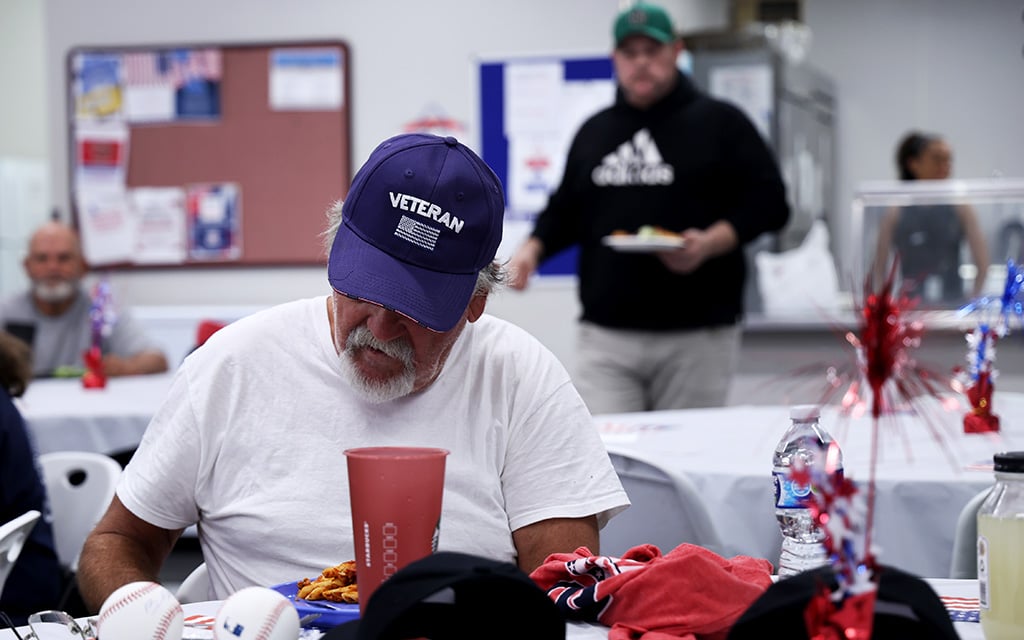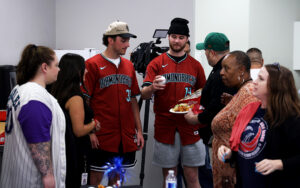
The Catholic Charities MANA House provides housing, meals and workforce re-entry programs for veterans from all branches of the U.S. military. (Photo by Travis Bradley/Cronkite News)
PHOENIX — In an unsuspecting building, just off Interstate 17 and between West Cypress and West Holly streets, sits the Catholic Charities MANA House. Within those walls live approximately 70 veterans, all struggling to varying degrees with finding a home.
In a state that ranks 11th in the country for veterans per capita and 10th overall in terms of the total number of veterans per state, the MANA House has found its own way of supporting this demographic in their times of need, and the Arizona Diamondbacks have joined their cause. Pitchers Ryne Nelson and Brandon Pfaadt took their efforts from the field and poured them back into an overlooked demographic in the community.
The pitchers served lunch, signed autographs and mingled with residents from the transitional living center Friday as part of the team’s ongoing commitment to serve the veteran community.
MANA House’s senior program director, Nicole Gibson, said that having the opportunity to bring in local stars like Pfaadt and Nelson results in an incredible amount of appreciation from the residents.
“They know the support we receive from the community, and they’re really excited when they have the opportunity to connect this way,” Gibson said.
The Diamondbacks have shown their support for this group of men in more ways than one, Gibson said. In addition to Pfaadt and Nelson volunteering to serve lunch, sign autographs and shirts, the Diamondbacks also provided the entire commercial kitchen that the MANA House uses to feed their residents.

Pitchers Ryne Nelson and Brandon Pfaadt hand out autographed baseballs while Nelson discusses how to throw a curveball with residents at the Catholic Charities MANA House Friday. (Photo by Travis Bradley/Cronkite News)
Residents such as Bruce Stewart, who recently turned 40 and served in the U.S. Army in Korea, Iraq and Afghanistan.
Stewart has learned over time that one of the biggest obstacles for veterans to overcome in their search for housing and financial support is taking the initiative to ask for help. This is his second time being unhoused since returning from service, and he knows firsthand how difficult it can be to find a helping hand, he said.
“I think the biggest part is that most veterans don’t believe they deserved it or earned any of that,” Stewart said. “We don’t want to intrude or whatnot, but once you get to this point, you don’t have to be afraid if you’ve earned it or not — we earned it.”
Veterans often struggle with something called “Moral Injury,” according to National Veterans Homelessness Support. This occurs when veterans suffer considerable psychological distress due to their actions or inactions while serving that often contradict their moral or ethical code.
The result is often a deep feeling of betrayal, and a number of other psychological symptoms, including:
- Strong feelings of shame, guilt or disgust
- Difficulty trusting themselves or others
- Feelings of unworthiness
- Struggling with the forgiveness of self or others
- Alienation from others
Whether or not Pfaadt or Nelson knew that before arriving on site was irrelevant, as a kind and helpful hand is often one of the best treatments for combating these feelings in others. Pfaadt said that he sees chances to serve others as less of a commitment and more of an opportunity.
“This isn’t a burden, coming out and helping the community,” Pfaadt said. “I’ve always respected what these guys do, and they deserve better.”
Nelson would tend to agree.
“There are a few events that the Diamondbacks do that I’m very eager to help out with, and this is definitely one of them,” Nelson said.
Although statistics from the Veterans Affairs website show a reduction of over 11 percent in unhoused veterans since 2020, the struggle is far from over in the Valley.
The challenge starts with the misunderstanding that people tend to view homelessness as a personal decision, and not the result of a series of unfortunate circumstances, according to Gibson.
“People tend to think people experiencing homelessness is a choice or a result of the decision that they’ve made,” Gibson said. “And often people just find themselves in hard times. They have an unplanned medical bill or an unplanned crisis that happens, so they find themselves in a situation they never thought they would be in.”
Supporting unhoused veterans in the Phoenix area is a mission that’s far from complete, and it’s one the Diamondbacks have embraced.